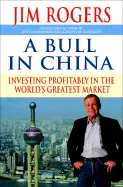
A Bull in China - by Jim Rogers
ISBN: 1400066166Date read: 2008-08-06
How strongly I recommend it: 1/10
(See my list of 430+ books, for more.)
Go to the Amazon page for details and reviews.
Very specific book about investing in China's stock market.
my notes
China's version of alphabet soup:
A-Shares : listed on Shanghai and Shenzhen exchanges, available to domestic Chinese investors only. In renminbi. QFII institutionals can buy now, too.
B-Shares : Started in mid-1990s solely for foreigners. ("A bubble developed, but eventually popped, until people were practically giving away B-Shares, which is why I started buying them in May 1999.") In 2001, Chinese citizens can access them if they could show they were starting accounts for foreigners, so money flooded in from overseas Chinese. Denominated in Hong Kong dollars on the Shenzhen exchange and US dollars on the Shanghai exchange. Due to lower demand, the long-term performance of B-share market has lagged far behind the A-share market. Many companies don't issue them and many Chinese won't touch them because they have the stigma of being foreign. This could lead to opportunities since many B-shares may eventually be merged with the A-share market.
H-Shares : Hong Kong, freely open to all foreigners. Stock exchange of Hong Kong - Hang Seng index.
S-Shares : Singapore exchange (hyperprosperous and defiantly capitalist Singapore). Over 14% of all listings in Singapore are Chinese companies. Freely tradable and convertible.
N-Shares and ADRs : New York : Chinese companies listed directly on NY Stock Exchange or NASDAQ. Once considered prestigious, but now Asians drive their own prices high enough and IPOs are a lot more expensive to mount in the US, so listings suffered and may slow.
L-Shares : London, but like US, affected by new regulations in China discouraging this. Smaller Alternative Investment Market (AIM) in London has long been a destination for Chinese companies, with 46 current listings.
J-Shares : Japan.
There is no special advantage to what letter of share one holds - except of course if you can find the same share at a lower price. Prices can and will fluctuate. In early 2007, A-Shares were about double the price of B-Shares, and a third higher than H-Shares, so it's definitely worth it to keep tabs on this.
The huge discounts in prices in Hong Kong may well disappear soon. Likewise, we should see the previous, comparitively lower prices for Chinese shares in Hong Kong rise as the mainland money seeks out cheaper Chinese stocks in Hong Kong and eventually everywhere else they can be found.
My view, in general, is to stay away from frenzies and to look at IPOs if and when the boom declines. I never was one for flipping stocks immediately. My timing isn't that deft. I prefer to wait for a time when IPOs are more humdrum or even downright disregarded.
--
Another strategy might be to invest in the province of Fujian, on the mainland just across from Taiwan. Most of Taiwan's original settlers came from Fujian and speak the local Fuzhou dialect. As a result of the ongoing tensions, real estate and other sectors are cheaper in Fujian compared to other developed regions of China. If real peace comes, Fujian is sure to boom.
Whatever the risks, this much is clear : it's more scary to have all your savings in the U.S. stock market than it is to put a portion in China, whether investing in China's growth or as a hedge against a potential U.S. slowdown.
China is already a formidable financial market in its own right. There will be enormous opportunities there no matter what happens on the other side of the world. Astute investors will get their confidence tested by periodic hurdles and occasional clouds of crisis. If you are as convinced as I am of China's promise, you will invest when fear depresses prices, and benefit in the long term.
Agriculture, tourism, water resources, and selected service industries could have big upsides and may have good chances to weather dips or bubbles.
It's good to answer these questions: (anywhere, not just China)
- Does the company have too much debt?
- Does it have good profit margins?
- Does it grow nicely?
- Does its management have strong incentives to succeed (large stock ownership or options)?
- Does it have strong competition or is it a dominant player?
- Is it a leader or a follower?
- Is it in a growing market, for example iPods instead of horseshoes, BMWs instead of bicycles?
--
What excites me most is the relative youth of the industry (tourism). Thing along the lines of the U.S. around the time the first decent highways were built and the concept of motels or Holiday Inns came into fashion. Think of Germany and Japan after the 2nd World War once the people there had recovered their resources enough to start seeing the world in a better way. Along with agriculture and water resources, travel - both foreign and especially domestic - could be one of the most "recession-proof" areas for investment. And once stocks can weather bad times, they get talked up even more.